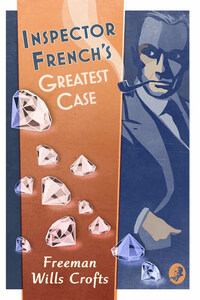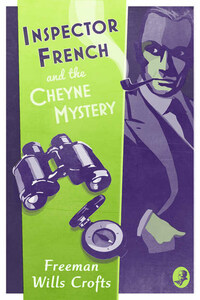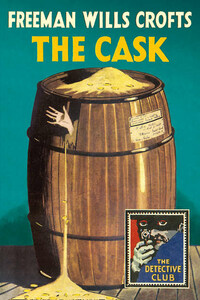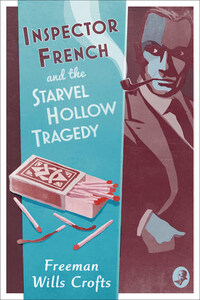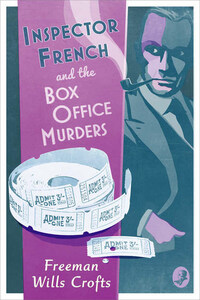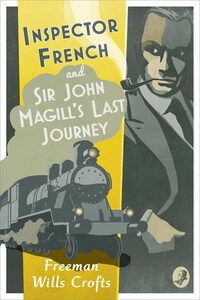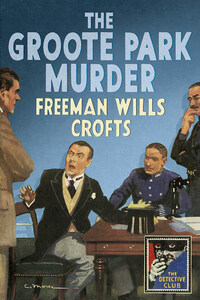Published by COLLINS CRIME CLUB
An imprint of HarperCollinsPublishers Ltd
1 London Bridge Street
London SE1 9GF
www.harpercollins.co.uk
First published in Great Britain by Wm Collins Sons & Co. Ltd 1924
Copyright © Estate of Freeman Wills Crofts 1924
Introduction © Estate of Freeman Wills Crofts 1937
Cover design by Mike Topping © HarperCollinsPublishers Ltd 2016
A catalogue copy of this book is available from the British Library.
This novel is entirely a work of fiction. The names, characters and incidents portrayed in it are the work of the authorâs imagination. Any resemblance to actual persons, living or dead, events or localities is entirely coincidental.
All rights reserved under International and Pan-American Copyright Conventions. By payment of the required fees, you have been granted the non-exclusive, non-transferable right to access and read the text of this e-book on screen. No part of this text may be reproduced, transmitted, down-loaded, decompiled, reverse engineered, or stored in or introduced into any information storage and retrieval system, in any form or by any means, whether electronic or mechanical, now known or hereinafter invented, without the express written permission of HarperCollins.
Source ISBN: 9780008190583
Ebook Edition © November 2016 ISBN: 9780008190590
Version: 2018-08-17
I have been asked to tell you something about Chief-Inspector Joseph French of the Criminal Investigation Department of New Scotland Yard. I shall do my best, but I thought it would give you a better idea of him if I were to bring the man himself to the microphone. So with a good deal of trouble I have persuaded him to come, and heâll speak to you himself. But I have put him in the next room for the moment, lest his ears should burn from my introduction.
As heâs not here, then, I may say that heâs really quite a good fellow at heart. Heâs decent and heâs straight and heâs as kindly as his job will allow. He believes that if you treat people decentlyâyouâll be able to get more out of them; and he acts on his belief. Politeness is an obsession with him, and he has well earned his nickname of âSoapy Joe.â Heâs far from perfect, but I have known him now for many years, and I donât wish for a better friend.
But I have to admit that heâs not very brilliant: in fact, many people call him dull. And here Iâll let you into secret history. Anyone about to perpetrate a detective novel must first decide whether his detective is to be brilliant and a âcharacter,â or a mere ordinary humdrum personality. When French came into being there seemed two good reasons for making him the second of these. One was that it represented a new departure; there were already plenty of âcharacterâ detectives, the lineal descendants, most of them, of the great Sherlock. The other reason was much more important. Striking characteristics, consistently depicted, are very hard to do.
I tried therefore to make French a perfectly ordinary man, without peculiarities or mannerisms. Of course he had to have some qualities, but they were to be the ordinary qualities of ordinary fairly successful men. He was to have thoroughness and perseverance as well as a reasonable amount of intelligence: just the qualities which make for moderate success in any walk of life.
From this it follows that he does not leap to his conclusions by brilliant intuition. He begins a case by going and looking for information in those places in which he thinks information is most likely to be found. When he gets the information he swots over it until he grinds out some sort of theory to account for the facts. Very often this turns out to be wrong, but if so, he simply tries again till he thinks of something better.
French I made an inspector of the Yard rather than a private detective because I hoped in this way to gain realism. But at once a horrible difficulty loomed up: I knew nothing about Scotland Yard or the C.I.D. What was to be done? The answer was simple. I built on the great rock which sustains so many of my profession: if I knew nothing of my subject, well, few of my readers would know any more.
As a matter of fact I have found this rock not quite so steadfast as I had hoped. It has been pointed out to me that French has at times done things which would make a real inspector of the Yard shudder. He has consistently travelled first-class on railways, particularly in sleeping-cars. He has borrowed bicycles from local police-officers without paying for their hire. He has undertaken country inquiries without his attendant sergeant. And many other evil things has he done. Fortunately, now that he has become a chief-inspector he is seeing the error of at least some of his ways and being more careful to live up to his great traditions.
